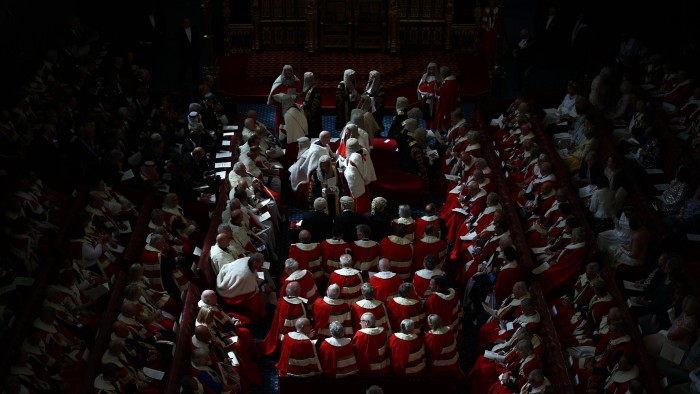Unlock the Editor’s Digest for free
Roula Khalaf, Editor of the FT, selects her favourite stories in this weekly newsletter.
The writer is a historian and public speaker
What to do when the party’s over? When the function you were bred to perform is no longer there? These are questions facing the remaining hereditary members of the UK’s House of Lords as they await the (political) axe.
For 700 years, hundreds of seats in the upper chamber of the legislature were passed (largely) from father to son down aristocratic lines. Then, in 1999, Prime Minister Tony Blair started dismantling this element, leaving only 92 hereditaries among the peers appointed for life. The current Labour government has introduced a bill with a view to ending the anomaly of receiving political office via bloodline rather than ballot box; by the end of the current parliament, it aims to have completed the dismantling. In deciding that, in a democracy, noble (although not royal) succession can have no political place, Britain has begun to inhabit a plateau long shared by other European countries.
There will still, for now, be dukes, marquesses, earls, viscounts and barons in Britain, just as grandees and nobles both titled and untitled remain in Spain. Old aristocracies similarly survive in Belgium, Denmark and Sweden. Even France and Germany, which officially abolished their nobility, allow a prominent, if politically irrelevant, place for those who claim a direct link to mighty names of the past, while members of the Medici, Visconti or Sforza families remain significant in Italian society today.
When Aristotle and Plato used the term aristocracy, they meant “rule of the best”, without any hereditary component. But when we think of aristocracy today, we think first of inherited status and land. France addressed this inequality issue in the late 18th century, when the guillotine claimed many victims from 12,000 aristocratic families. Yet after that grim cull, rulers from Napoleon onwards added many fresh recruits to what remained of the aristocracy. More French people claim noble status today than before the revolution.
There is even a body, the Association for Mutual Help of the French Nobility (the ANF). It was founded shortly before the second world war, after two French aristocrats were shocked to discover that the porter hefting their luggage at a railway station shared their rarefied social background. The ANF still helps nobles who have fallen on hard times today.
According to the ANF’s vice-president, Bérangère de Beaucoudrey: “Great humility, and sometimes even modesty, motivates families in difficulty to want to remain discreet. However, when the situation is no longer tenable, they then come forward by writing directly to the association.”
Henri de Castries, the fifth Count of Castries, needs no such aid. He was chair and chief executive of insurance group Axa from 2000 to 2016, then chaired the Bilderberg Group — an annual forum fostering dialogue between Europe and North America — for seven years. His family tradition was in the military but, after completing national service, he chose business and a law degree. Today this accomplished aristocrat graces the board of LVMH.
Indeed, commerce is an attractive route for European aristocrats, who can no longer rely on ancient fortunes or public subsidies. Spain’s Vicente Dalmau Cebrián-Sagarriga, the Conde (Count) de Creixell, has been president of Marqués de Murrieta, the oldest operating winery in Rioja, since inheriting it in 1996, when he was just 26. He and his sister Cristina invested $60mn into slowly turning his vineyards into arguably the finest in Spain, marrying a long established reputation with avant-garde practice. His business concept was aristocratic in its design: keeping tradition, while making changes.
His efforts are respected in a land where, a Spanish friend tells me, “the aristocracy now don’t have legal privileges, but they have social influence. And they are expected to behave according to their status. Some of them do useful things, and create work.”
An aristocratic name can still open doors. Eduard von Habsburg, from the dynasty which controlled a European empire that included modern-day Germany, Austria, Italy and Belgium, would be an archduke of Austria if that title were not extinct. But he has found a way of continuing his distinguished name in a lighter vein. His serious role is as Hungary’s envoy to the Holy See (the Vatican), in keeping with his ancestry, but he has also penned the screenplay for a zombie movie, written books for children and produced cartoons. The loss of political status has allowed him to do as he wants with his life.
These are all potential futures for the British aristocracy, although it has survived difficult spots before. In the 19th century, it was squeezed hard by higher taxation and agricultural imports from the Americas, undercutting incomes from landed estates. The newly impoverished sons of the nobility engaged in hundreds of marriages with American “dollar princesses”, heiresses whose families traded generous dowries for titles. The ninth Duke of Marlborough married Consuelo Vanderbilt, of the railroad dynasty, and received $2.5mn, as well as an annual payment of $100,000. This union perhaps saved Blenheim Palace, the duke’s vast ancestral home.
Now, when Labour calls time, there will be no wriggle room. Direct political power will be gone. But there is an unlikely consolation. At present, the only British citizens unable to vote in UK parliamentary elections are prisoners serving a sentence for a conviction — and peers sitting in the House of Lords. They will be trading their ancient aristocratic status for direct involvement in the democratic process.




